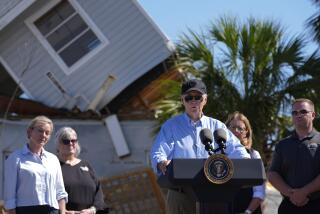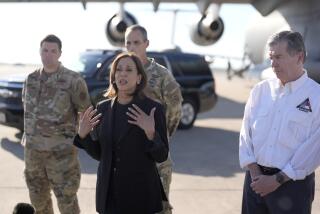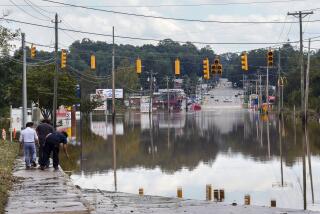Can-do -- and did
PRESIDENT BUSH MARKED THE first anniversary of Hurricane Katrina on Tuesday with a speech in New Orleans saluting volunteers from across the country. He’s right. Their overwhelming show of compassion shined a rare light in a dark time.
For the last year, college and high school students have given up holiday ski trips and spring-break beach vacations to tear down walls and shovel rubble. Churches have sent squadrons of teenagers and retirees. Individuals of all ages have taken time off from jobs and families and headed south to see what they could do to help.
Christie Tedmon, a champion gymnast who graduated from UCLA in June, was one of them. Last September she headed to Gulfport, Miss., with 13 other members of Bel Air Presbyterian Church. She unloaded trucks full of donated clothing and food, sawed fallen trees and dragged moldy furniture out of houses. The people she came to help were grateful -- and surprised. “You came all the way from California to help us?” they asked.
As so often happens when volunteering, the help flowed both ways. “One of the last days we were there,” Tedmon said, “we were helping to tear out the inside of a house owned by a couple in their mid-70s. They worked right alongside us. It broke my heart to stand next to this couple who had to tear down the house they’d lived in their whole lives. And yet the next morning they made us breakfast at the church at 6 in the morning before we headed to the airport.”
A year later, the volunteers continue to arrive.
Earlier this month, UCLA psychology professor Vickie Mays asked fellow members of the American Psychological Assn. to arrive early for their long-scheduled annual meeting in New Orleans. They gave workshops for local mental health counselors, ministers, teachers and parents to treat the estimated half a million hurricane survivors suffering from anxiety, depression and post-traumatic stress.
Like the president, Mays was overwhelmed -- though not just by the outpouring of help from youth groups, churches and her fellow psychologists. What struck her was the eerie silence in block after block of shattered homes, schools and churches in the city’s Lower 9th Ward. A year after the hurricane, it was hard to believe that this was part of the United States. “Without volunteers,” she said, “God knows how bad it would be.”
Volunteers richly deserve the president’s praise. But the Gulf Coast communities depend on his promise that government, though late to arrive, won’t walk away until the job is done. And the whole country depends on his promise that a government so clearly unprepared for that natural disaster will be ready for the next one.
More to Read
Sign up for Essential California
The most important California stories and recommendations in your inbox every morning.
You may occasionally receive promotional content from the Los Angeles Times.










